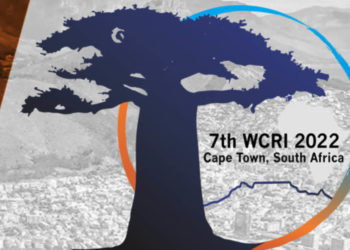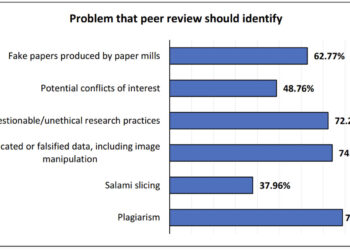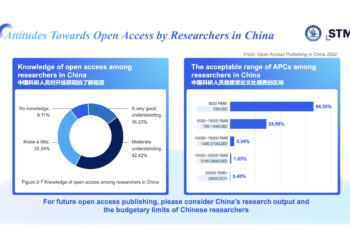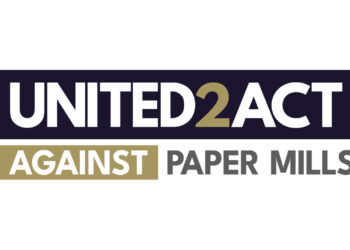Editor’s Note: Today’s post is by Panagiotis Kavouras, Eleni Spyrakou, Maura Hiney, and Daniel Barr. Panagiotis is a senior researcher at the School of Chemical Engineering of the National Technical University of Athens. During the last six years he has focused his research interests on research integrity through his participation in several relevant EU-funded projects. Eleni is a senior researcher at the School of Chemical Engineering of the National Technical University of Athens. During the last 4 years she has focused on research ethics and research integrity through Horizon 2020 and Horizon Europe projects. Maura is Adjunct Professor of Research Culture in University College Dublin, and was previously a senior manager at the Health Research Board Ireland. She has been involved in advancing research integrity (RI) policy for many years, is Treasurer of the World Conference on RI Foundation and Co-chair of the 8th WCRI. Daniel is the Principal Research Integrity Advisor at RMIT University, Australia. He is involved in management, teaching, and research in research integrity and ethics, and is co-author of the Asia-Pacific Economic Cooperation’s Guiding Principles for Research Integrity.
The transformation of scientific research into a commodity, a service, or a specific policy is a complex process that falls under the broader terms of translation and (social) innovation. This process transforms scientific outputs into products directly used by societies or into governance measures that directly affect the lives of societies. Examples of scientific outputs can be promising therapies that have not gone through the process of clinical trials, innovative materials whose function has not been tested in real-life conditions, or theories that interpret the behavior of societies. Examples of products and governance measures can be high-performance car brakes, healthcare innovations that are routinely applied in clinical care, or policies that govern the educational system applied to the children of first-generation immigrants in a specific country.
These products and governance measures are the palpable outcomes or the echoes of what has happened at the laboratory bench, in an experimental facility, in a software simulation, or in the field. In a sense, they are the interface of science with society. Obviously, the quality of scientific research outputs affects the quality of these products and governance measures, in terms of their validity, reliability, robustness, safety, and social relevance. They take, or they ought to take, into account the complexity of everyday needs, not only as they are formed in the present, but also with foresight for the future and an anticipatory character, with the aim to deal with new challenges in an ever-changing era. In that sense, translation and (social) innovation become central as they are new ideas that meet social needs, create social relationships and form new collaborations.
Since the turn of the century, there has been increased concern about the quality of the scientific outputs, mainly discussed in the context of the “reproducibility crisis”. Irrespective of whether the term “crisis” accurately describes the current situation in research, it seems to capture the zeitgeist of our time. For example, several high-profile cases of research misconduct that appeared in mass media during the last two decades raised concerns among the research community, actors within the research enterprise, and citizens about the extent and depth of what seem to be signs of a non-optimal functioning of scientific research. The stakes cannot be higher, since a potential breach of trust of societies in science will, most probably, be transposed to the products and governance measures produced by scientific research.
These concerns about the reliability of scientific outputs have brought together a diversity of stakeholders, active in and throughout the spectrum of the research enterprise with the sole aim of making them as reliable and trustworthy as possible. This is more easily said than done, since the challenges are manifold and reflect the modus operandi of research, which is directly related to the funding, conduct, communication, and governance of research. This diverse group of stakeholders has formed a community of interest and practice that de facto gave birth to the field of research integrity, which is now a separate field of research, albeit highly interconnected with research ethics and responsible research and innovation.
Moreover, the compilation of the list of societal needs within an international environment is complex and calls for solutions that result from interdisciplinary synergies. To that direction, principles and standards of research integrity can compile a shared groundwork for all disciplines (Natural Sciences and Engineering, Medical Sciences, Humanities, Social Sciences). The scope of application has an impact on society as a whole, hence responsible, evidence-based policy making cannot be overestimated.
Up to now, the focus of research integrity has mainly been on improving all stages of the research cycle as applied by universities and research centers; in other words, research that is located very upstream in the process of translation and (social) innovation. While this is an excellent start, considering that translation and (social) innovation are processes deeply rooted in basic and applied science, we should not lose track that science has significant differences, as a process, with regard to translation and (social) innovation. For example, different actors are more prominent at different stages of transforming scientific outputs into products or governance measures. At the same time, translation is not governed only by the norms of science but also by the norms of the economy and the market.
As a result, it seems plausible that the positive impact of research integrity, as a coherent and consistent adherence to principles that underpin the trustworthiness and value of research, might be more pertinent for research that has not yet taken the arduous transformative path of translation and (social) innovation. For some time, this shortcoming has been on the radar of the World Conferences of Research Integrity Foundation, an entity that promotes research integrity “through support for the ongoing organisation of the World Conferences and all related activities” as declared on the Foundation’s website.
The 2nd World Conference on Research Integrity (WCRI) that took place in Singapore in 2010 developed the “Singapore Statement”; a high-level document envisioned to act as a global guide to the responsible conduct of research. The Singapore Statement brought forward a set of four principles, Honesty, Accountability, Professional courtesy and fairness, and Good stewardship, and 14 professional responsibilities “that are fundamental to the integrity of research wherever it is undertaken”. The preamble of the Singapore Statement makes the strong claim that “(t)he value and benefits of research are vitally dependent on the integrity of research.” These “benefits” are exactly the potential impacts of the offspring of research, i.e. products and governance measures, that will be brought into real life via the processes of translation and (social) innovation.
Nine years later, during the 6th WCRI that took place in Hong Kong, an effort was made to address whether the Singapore Statement already served as an overarching framework within which innovation could find relevant guidance. This effort was made in the context of two Focus Track sessions with the title “Ensuring integrity, innovation and impact.” The question posed and discussed with the participants of the 6th WCRI was “How can translational and other users TRUST our research evidence, and are the principles of research integrity captured in the Singapore Statement enough?”
The discussions that took place in Hong Kong concluded that all four principles of the Singapore Statement remain completely relevant at all stages of the research process and for all actors. However, to ensure trust in the process of translation, implementation, and uptake of research outcomes, two additional principles need to be considered to expand the “arsenal” of guiding principles. The first is Transparency in the research process and in the presentation of results. The second is Clarity of communication to ensure that the information communicated about innovation is understandable, explainable, and accessible. These two additional principles were understood as facilitating the responsible communication of crucial information, like priority setting for the research and its translation, and the limitations of the research. They were also envisaged to empower user engagement for a better understanding of scientific results, their innovation potential and to sensibly manage the expectations of policy-makers and government, enterprise and industry, as well as civil society.
With the 8th WCRI taking place in Athens, June 2—5, 2024, the time is ripe to widen the scope of the work done in Hong Kong, by digging deeper into the complexities of translational research and innovation by including, more prominently, the element of social innovation, as a term describing evidence-based policy. This widening exercise will be done in the context of two Focus Track sessions entitled “Catalysing the translation of research into trustworthy policy and innovation”.
Additional considerations that need further exploration and will fertilize discussions in Athens include whether current approaches, aimed largely at producing trustworthy primary research, also ensure that the translation and implementation of research findings are trustworthy, and what the perspectives and roles of policy-makers and industry are for trust in the research and innovation processes. We want to open up a discussion between researchers from all academic disciplines, research integrity practitioners, decision-makers in Small & Medium Enterprises and industry, as well as policy-makers, that will highlight research integrity as an enabler of trustworthy translation and (social) innovation.
At this point, there is an urgent need for an interaction between the wide spectrum of relevant stakeholders that transcends the one traditionally devoted to the discussions of research integrity. We believe that research integrity plays a critical role here. Having established a framework of good practice for producing reliable research results, mainly in the areas of basic and applied research, research integrity can provide a lingua franca between the communities that do basic and applied research, translational research and innovation, and policy making. It seems that a circular approach is needed, namely the circle of responsible innovation: Reliable technology leading to reliable social innovation which, in turn, leads to responsible policy making; which can again result in reliable technology. This provides the rationale for the research effort that the organizers of the 8th WCRI have launched. We hope that this research will result in a declaration that provides a framework for credible translation, innovation, and policy making.
Following the ancient Greek philosopher Heraclitus, who claimed that the only constant in life is change, this statement might achieve one small step towards the evolution of research integrity into Innovation Integrity.




